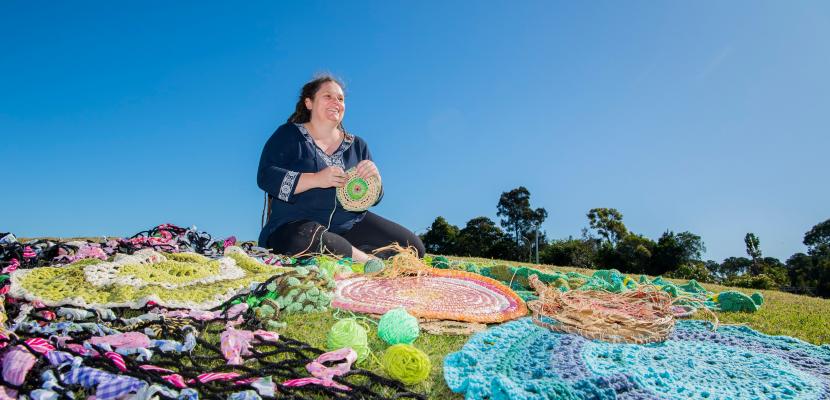
On a lush grass mound behind Bond University’s Abedian School of Architecture, a group of local women are gathered in a circle, chatting quietly, as they practice the ancient art of weaving.
The group, made up of around 25 first-time weavers as well as skilled craftspeople, are two months out from completing an artwork for SWELL Sculpture Festival.
First Nations artist, Desert-Rain Magpie, says she is honoured to have helped introduce the art of weaving to members of the Gold Coast community.
“We’ve been working on this artwork at Bond University since November last year with the help of people from all different ages, backgrounds and skill levels,” says Desert-Rain.
“One thing that’s wonderful about the group is that there’s twelve local Aboriginal and Torres Strait Islander women who take part and help teach the group.
“Many of them travel to remote communities, so in a way we are connected here on the Gold Coast, but then that connection spreads out all over the country.”
Born in Western Australia, Desert-Rain spent a decade in the military, before turning to weaving as a full-time venture.
“I was in the military for ten years, and as a result of that service I suffer from PTSD and anxiety,” explains Desert-Rain.
“After my service, I lived in Nimbin, where pretty much everyone knew how to weave. I found that weaving helped manage the symptoms of my conditions.
“When I moved to the Gold Coast and had my son, I started taking him to Aboriginal play groups, and the mums were always looking for things to do – so I started showing them how to weave.”
The art of weaving, which has been practiced by Aboriginal and Torres Strait Islander people for generations, can strengthen cultural identity and improve mental health, says Desert Rain.
“Any activity that involves repetitive movements, actually works to relax our sympathetic nervous system.”
“The physical things people will notice when weaving are that their shoulders will drop, their breathing will slow, their heart rate will slow, and their eyes will soften.
“When you sit, talk and connect with other people, very quickly, the things that are worrying you bubble up to the surface. Weaving acts as a bit of a social lubricant. It’s similar in the way people might go to the pub together and drink alcohol, only weaving is much healthier for you and you’ve got something to show for it at the end.”
Once complete, the group artwork will represent the non-linear journey of healing.
“Some of the pieces of weaving are representations of plants which heal, and others are abstract representations of people’s healing journeys,” says Desert-Rain.
“It doesn’t matter how it looks, what size it is, or what shape it is, because healing is different for everyone.”
Desert-Rain offers a range of arts and cultural services through her business Magpie Dreaming. As part of this she teaches a monthly weaving drop-in session at Bond University.
The Indigenous weaving group is held on the second Thursday of each month at Bond University.
The class is open to the community and no prior weaving experience is required. For more information and to register attendance, please visit magpiedreaming.com.au.

